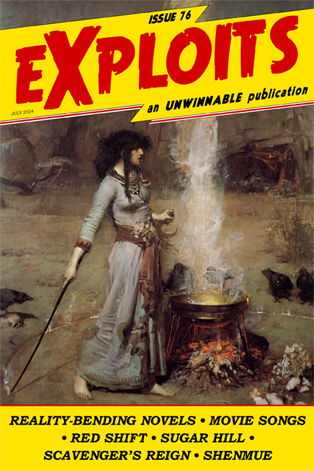
Three New Novels That Change How You Think about Reality

This is a reprint of the feature essay from Issue #76 of Exploits, our collaborative cultural diary in magazine form. If you like what you see, buy it now for $2, or subscribe to never miss an issue (note: Exploits is always free for subscribers of Unwinnable Monthly).
———
The older I get, the more I gravitate towards fiction that messes with the real. The more information, content and news I consume, the less I understand and the more numb I feel. So I’ve come to crave fiction that makes something of this chaos. Because fiction isn’t just an escape – it shouldn’t just offer conclusion and redemption. Fiction can also deform reality in a way that it forces us to examine our own realities more closely and see them more clearly.
Marie NDiaye’s Vengeance Is Mine, Esther Yi’s Y/N and Jon Fosse’s A Shining are three contemporary novels that accomplish this. All three are simple enough on their surfaces. In Vengeance Is Mine, the protagonist Susane becomes convinced that her legal client’s husband is someone from her past. In Y/N, a reclusive copywriter falls in love with a K-pop star named Moon after attending a concert to appease her flatmate. In A Shining, an unnamed man takes a night drive to alleviate his boredom and ends up lost in the woods.
But less than ten pages into each novel, the parameters of reality become fuzzy. Dream, memory, fiction and hallucination blur into one another. As Talya Zaxe says in her review of Vengeance Is Mine, no one in these stories “seems to know who they are.” The more submerged they become in their trauma, memories or obsessions, the more lost they become to themselves.
In Vengeance Is Mine, Susane’s mounting preoccupation with decoding her past makes her present feel foreign, hostile and unstable. Her “good-hearted and emotional” parents become so oppressive that she wishes “they would just disappear.” Her childhood abuser becomes her protector and her own child becomes a stranger. Meanwhile, Susane is unconvinced about her own identity, too. Is she an accomplished, progressive lawyer, a generous, empathetic savior or a just failure of a woman?
In Y/N, after the narrator falls in love with Moon, the “violence of [her] desire” overtakes her. In one scene, while having sex with her boyfriend, her boyfriend’s body morphs into the pop star’s and the narrator levitates above the copulative scene. When she watches Moon’s livestreams, she’s convinced Moon is talking to her, singing to her and desperate to be with her. To the narrator, everything is “so much better” in her head. Her delusions are so enchanting that she’s willing to “become someone else entirely” to bring them to life.
In A Shining, the narrator knows he should go in search of help after getting lost in the woods, but ends up sitting on a rock communing with a glowing presence that may or may not be there at all. He knows he’s “going to freeze to death” if “a miracle doesn’t happen.” But even when a miracle does happen – his parents appear out of nowhere and offer to save him – the narrator remains confused and immobilized. Are those really his parents? And why should he, a grown man, accept their help when he “can go wherever” he wants and do whatever he likes?
While NDiaye, Yi, and Fosse don’t offer easy answers, their narrative deformities aren’t authorial gimmicks. Rather, they challenge us to resee reality by forcing us to inhabit alternate states of mind and being. Their novels embody the multivalent nature of truth itself. They deconstruct dangerous notions that truth is black and white, one-dimensional and therefore easily digestible. In NDiaye’s, Yi’s and Fosse’s worlds, truth and reality aren’t what you can see and touch. They aren’t even what everyone says they are. Rather, reality and truth prove to be as mutable as the most powerful mind in the room says they are.




